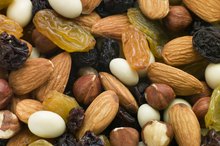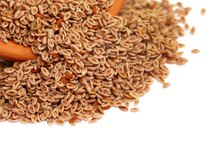Diet Restrictions with Ischemic Colitis
It's estimated that ischemic colitis, which is when blood flow to the large part of the colon is narrowed or blocked, is responsible for 1 out of every 1,000 hospitalizations, according to clinical practice guidelines from December 2008 published in "World Journal of Gastroenterology." While very mild cases can be treated as an outpatient with a liquid diet, antibiotics and close contact with your doctor, more severe cases require hospitalization. Diet restrictions for ischemic colitis depend on the severity of the ischemia and ranges from bowel rest to a liquid diet, with advancement as tolerated.
Bowel Rest
Your colon plays an important role in food digestion, including reabsorbing water from digested food to help maintain fluid balance, processing of fiber and holding waste before elimination (see reference 1 under The role of the large intestines bullet points). In severe cases of ischemia, your doctor may recommend you abstain from eating so your bowel can rest and heal (see reference 2 under Treatment para 1). If you're unable to eat for an extended period of time, usually more than 7 to 14 days, you may require parenteral, or intravenous, nutrition (see reference 2 under Treatment para 1, reference 3 pg 19SA column 2 top of pg 4.).
Only Liquids
Do Some Foods Aggravate Diverticulitis?
Learn More
If your case is mild or your colon has had time to heal, your doctor may suggest a clear liquid diet (see reference 2 under Treatment para 1), which includes clear juices such as apple or cranberry juice, broth, black coffee or tea, clear soft drinks, gelatin and fruit ice (see reference 4 pg 271 column 1 first full para). Clear liquids are easy to digest and provide electrolytes and hydration, but are not a good source of calories, protein, fiber, vitamins or minerals and should only be followed for a short period of time (see reference 4 pg 271 column 1 first full para).
Diet Progression
You may need to continue to restrict your intake as your diet progresses. The next step following a liquid diet is a low-residue diet, which is a diet that eliminates foods with tough fibers and allows the colon to continue to rest, but provides more nutrition than the liquid diet (see reference 5 pg D-1 under Descriptions under Indications bullet point 4 under Nutritional Adequacy, reference 6 pg 100 column 2 top of pg/para). The diet omits beans, nuts, seeds, seedy fruits and vegetables and fruit and vegetable skins, as well as any whole grains, buckwheat pancakes, brown rice and barley. (see reference 5 pg D-2).
Diet After Surgery
Bowel Blockage and Diet
Learn More
According to "World Journal of Gastroenterology," based on statistics from 1992, about 20 percent of those with ichemic colitis have surgery to remove the effected section (see reference 2 under Treatment para 3). Removal of part of your colon may require more long-term diet restrictions. [[Those with a colostomy, which is an opening at the end of your colon to your abdominal wall for stool output, may need to avoid odor-producing foods (see reference 4 pg 640 - I have my own edition). If you have an ileostomy, which is an opening created at the lowest part of your small intestines to your abdominal wall for stool output, you need to chew your food thoroughly and avoid fibrous foods to prevent an obstruction.]] (see reference 4 pg 640). Depending on the part of your colon that was resected, vitamin B-12 supplementation may also be necessary (see reference 4 pg 640).
Related Articles
References
- World Journal of Gastroenterology: Ischemic Colitis: Clinical Practice in Diagnosis and Treatment
- Krause's Food and the Nutrition Care Process; L. Kathleen Mahan, et al.
- Morrison Healthcare Food Services: Manual of Clinical Nutrition
- Gastrointestinal Disease: An Endoscopic Approach; Anthony J. DiMarino, et al.
Writer Bio
A registered nurse with more than 25 years of experience in oncology, labor/delivery, neonatal intensive care, infertility and ophthalmology, Sharon Perkins has also coauthored and edited numerous health books for the Wiley "Dummies" series. Perkins also has extensive experience working in home health with medically fragile pediatric patients.









